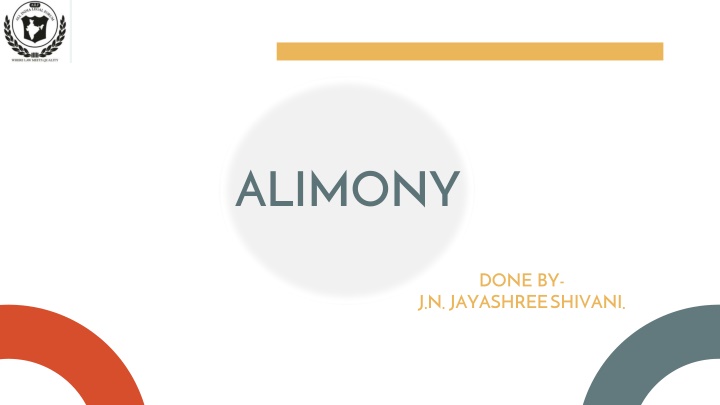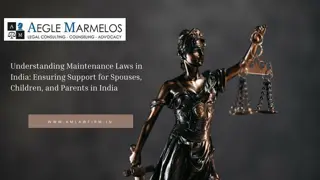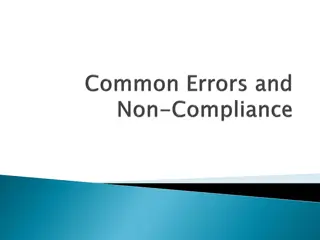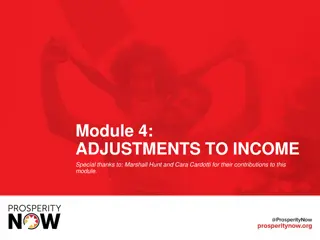ALIMONY
Alimony, court-ordered payments in divorce, provides financial support to a lower-income spouse. Learn about types of alimony, who can claim it, and recent legal changes in India.
Download Presentation

Please find below an Image/Link to download the presentation.
The content on the website is provided AS IS for your information and personal use only. It may not be sold, licensed, or shared on other websites without obtaining consent from the author.If you encounter any issues during the download, it is possible that the publisher has removed the file from their server.
You are allowed to download the files provided on this website for personal or commercial use, subject to the condition that they are used lawfully. All files are the property of their respective owners.
The content on the website is provided AS IS for your information and personal use only. It may not be sold, licensed, or shared on other websites without obtaining consent from the author.
E N D
Presentation Transcript
ALIMONY DONE BY- J.N. JAYASHREE SHIVANI.
INTRODUCTION Recently, in one of its judgment the Honorable Supreme court of India have lessened the cooling off period from 18 months to 6 months in attaining divorce. This have paved an easy path for the couples to walk away from unhappy marriages . Divorces are usually filed for various reasons ranging from - early and forceful marriages, lack of compatibility, conflicting view and interest, violence on the part of husband , his relatives and so on.
WHAT IS ALIMONY? Alimony refers to court-ordered payments awarded to a spouse or former spouse within a separation or divorce agreement. The cause behind it is to provide financial support to the spouse who makes a lower income, or no income at all.
Who can claim alimony? There is no hard and fast rule themselves after divorce or separation, be it wife or husband can claim it. no hard and fast rule on who can claim alimony. Any person who is unable to sustain In case, if the wife is working and there is considerable difference between the husband s earning and the wife s earning. Then , the wife can demand for alimony. If alimony is paid on monthly basis at least 25% of the husband s income. On the contrary, if it is paid on lump 1/3rd of the net worth of the husband. monthly basis, the supreme court has set mark that the amount should be lump it should be 1/5 th or Under Section 24 claim maintenance from their spouse. It doesn t differentiate between male and female. Section 24 of the Hindu Marriage Act, 1955, both the wife and the husband are entitled to
TYPES OF ALIMONY TYPES OF ALIMONY Permanent Alimony Rehabilitative Alimony Separation Alimony 02 01 03 Lump -sum Alimony Reimbursement alimony 05 04
1. SEPARATION ALIMONY The compensation made by one spouse to another when one among them isn t self sufficient enough to stay sustained during the period of separation is known as separation alimony . However, if the couple decide to live together later, then the alimony could be stopped.
2. PERMANENT ALIMONY The alimony that is to be paid for an indefinite period of time is permanent alimony . This is usually ordered: When the recipient is handicappedand When the recipient has no employment skills and has a responsibility to stay home and take care of the family.
3.REHABITATIVE ALIMONY This type of alimony is allowed only for a particular period of time and within that stipulated time the recepient is expected to acquire a skill and seek employment. So that he or she could earn and take care of themselves finacially.
4. REIMBURSEMENT ALIMONY When one spouse pays for the other spouse to put him/her through college or any other employment related program. After which if the person, starts earning more than than the recepient. In that case, the court may order the recepient to pay halfof the expenses incurred.
5. LUMP-SUM ALIMONY This is an one time settlement . It refers to the spouse fulfilling his/ her entire alimony obligation at once. After which, the spouse is under no duty to pay any sum amount / property to the recepient in the future.
Factors based on which alimony is decided by courts Factors based on which alimony is decided by courts Span of marriage Income of the spouse Career Child custody Responsibilities Lifestyle and the quality of life lead by them. Health conditions
IS MAINTENANCE AND ALIMONY THE SAME? YES. Both maintenance and alimony are paid by one spouse to another to provide financial support. Hence, there is no line of difference between maintenance and alimony. In India, the term maintenance is usually used before divorce and after divorce the term alimony is used. But, both the terms imply the same intent and meaning. It is known as alimony in India, ailment in Scotland, maintenance in countries like England, Ireland and Canada, and spousal support in the United States.
Is alimony taxable? There is no specific provision as such in the Income tax act of 1961 , regarding the payment of tax on receiving alimony. However, the way the payment was made will subsequently determine tax liability. Alimony when paid in lump sum If alimony is paid in lump, then it is treated as a capital receipt. Hence , it is not subjected to tax. Alimony when paid at regular intervals But if the alimony is paid on monthly or periodical basis then it is treated as a revenue receipt or income. Hence, it will be subjected to tax on hands of the bearer.
STRIDHANA (under Hindu law) Stridhanis a term that is mainly concerned with Hindu religion. The term stri means women and dhan means property. So, the word streedhan literally translates into women property . It is the property which the women receives at the event of her marriage from family , friends and well wishers. For which she owns absolute ownership. Hence , it is irrespective if she demands alimony or not . She has the absolute right to seek her property (i.e. movable or immovable) from her husband or from her in laws and can also demand for alimony at the same time
Alimony under Christian law Maintenance claim for wife in Christianity is dealt under Section 36, Section 37 and Section 38 of the Indian Divorce Act, 1869. Under this personal law, the husband cannotclaim for alimony. Section 36 through this section the wife can seek the petition for expenses and alimony pending the suit. Section 37- permanent alimony. Section 38- rules regarding payment of alimony. Alimony under Muslim Law Muslim Women(Protection of Rights on Divorce) Act, 1986 laid down the provisions for alimony. Hence, after the separation the wife is entitled to the following rights: A reasonable amount should be paid during the iddat period. Any amount equal to the dowry agreed to be paid at the time of marriage. A title to the properties given to her either before or after marriage should be given back.
On which grounds can the wife be refused the Maintenance? On which grounds can the wife be refused the Maintenance? When wife marries again, she looses her right to maintenance Lives in a separate house away from the spouse by mutual decision. When wife Commits adultery at the time of marriage Refuses to reside without a proper and reasonable cause. A PICTURE IS WORTH A THOUSAND WORDS Seperate residence Remarriage Adultery Refuses to reside
Punishment for refusing to pay alimony If the ex spouse fails to pay alimony money to the recipient, then it will be assumed and treated as if he has committed the offence of contempt of court . The punishment regarding this vary from case to case. Sometimes, a nominal penalty might be imposed or could be sent to jail for 6 months .
Conclusion Alimony is like a gift, to anyone who are unable to sustain themselves after walking away from an unhappy marriage. This helps them to overcome various financial obstacles and aids them to take care of their responsibilities with lot of dignity and respect.






